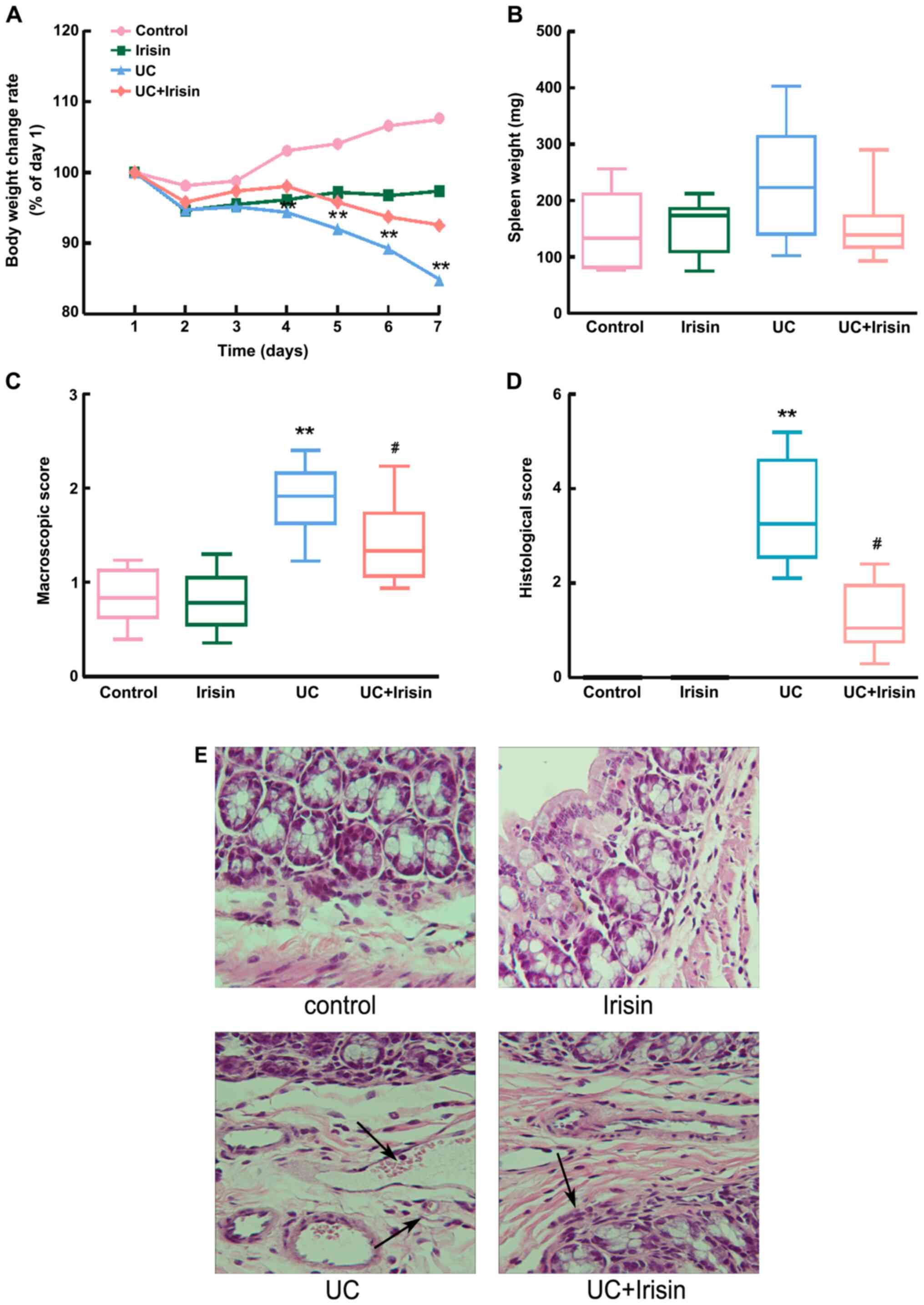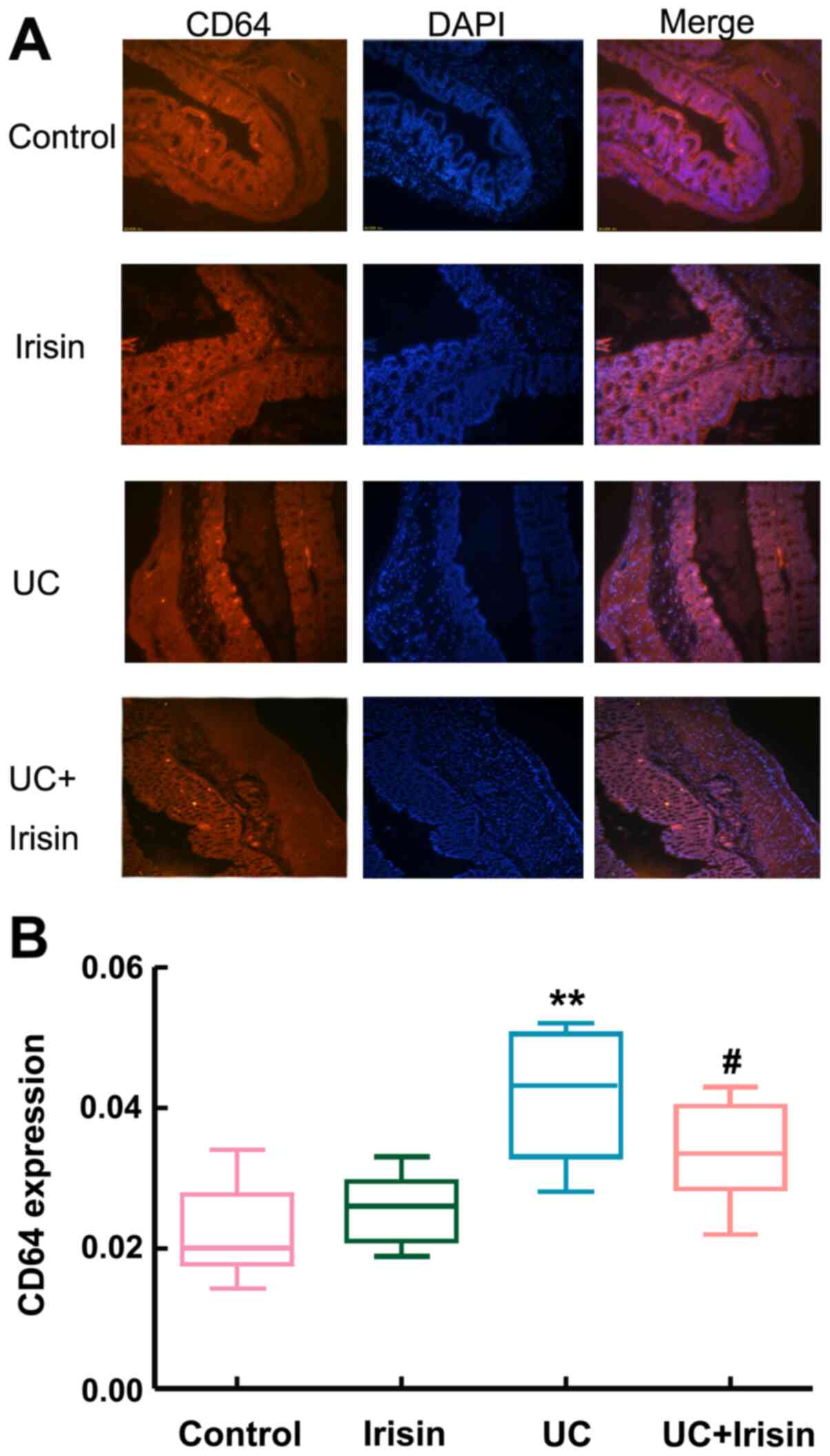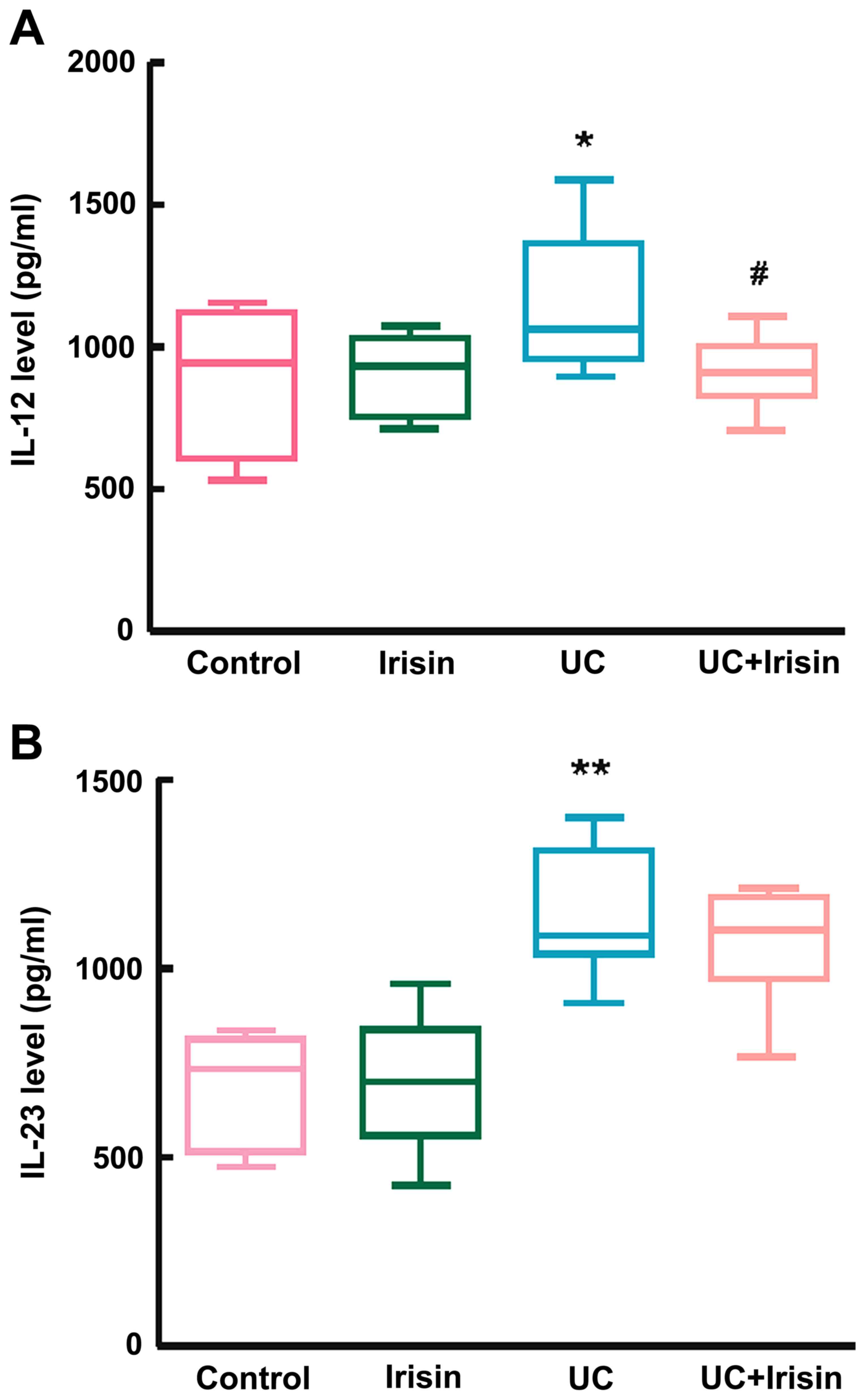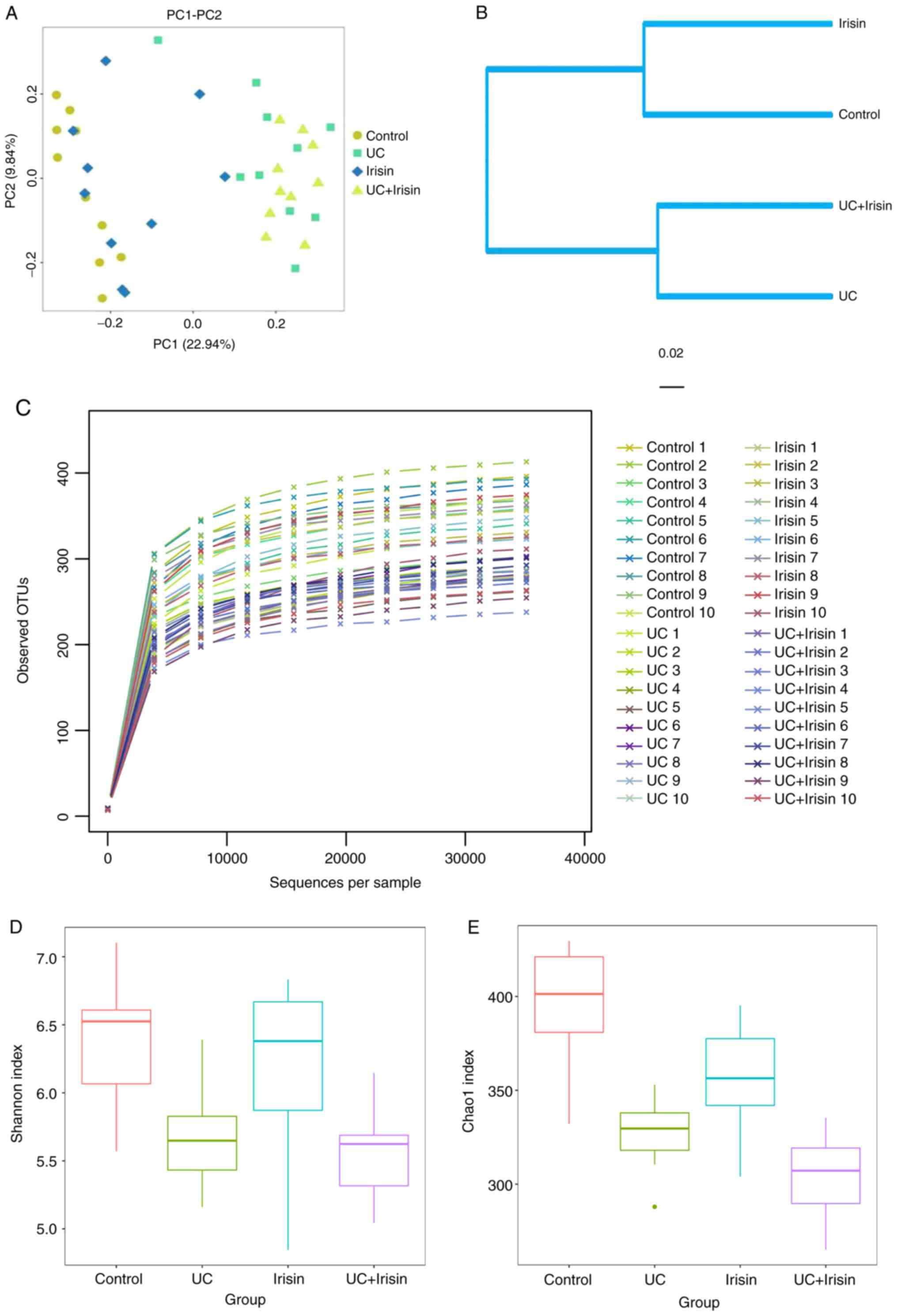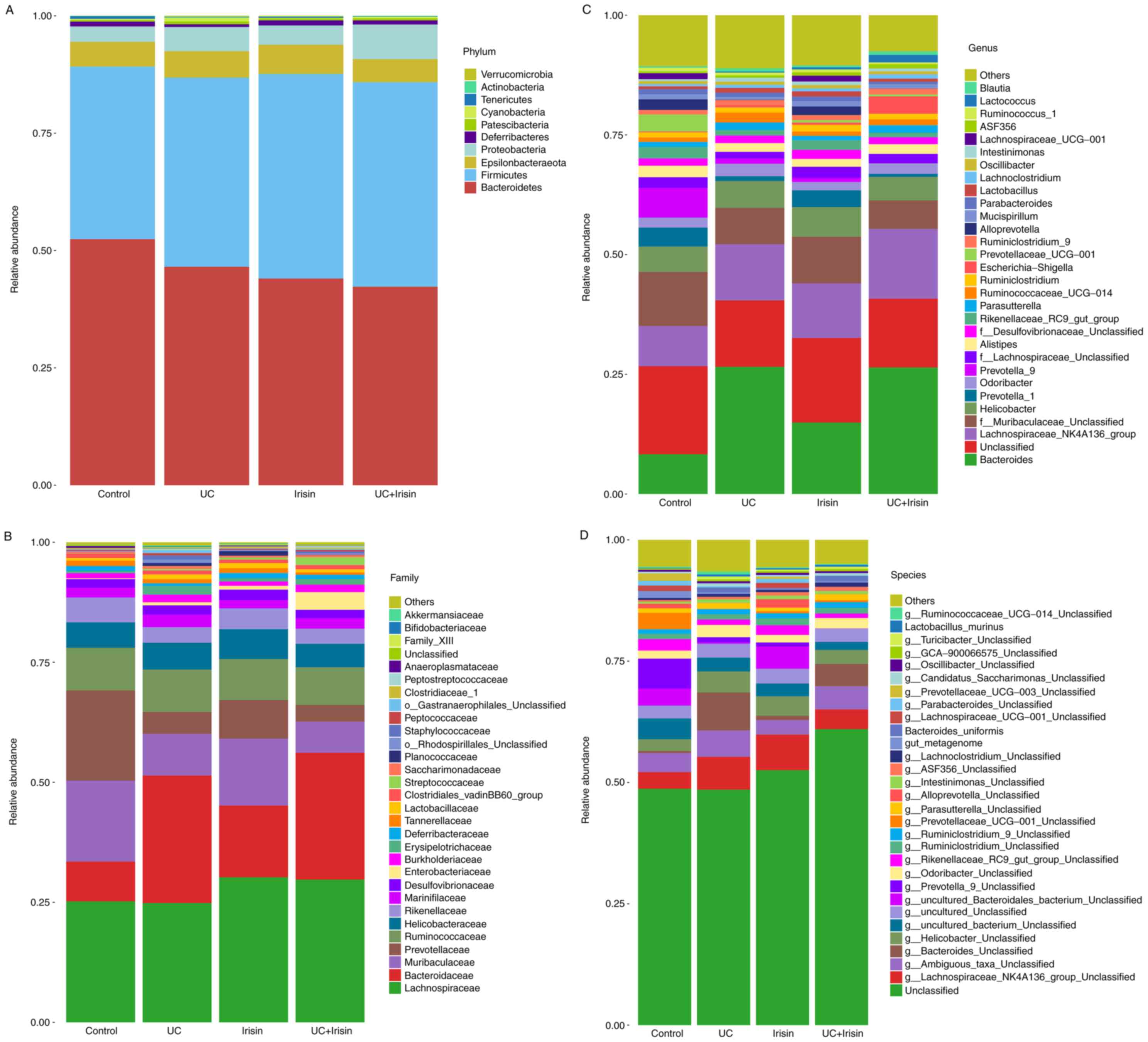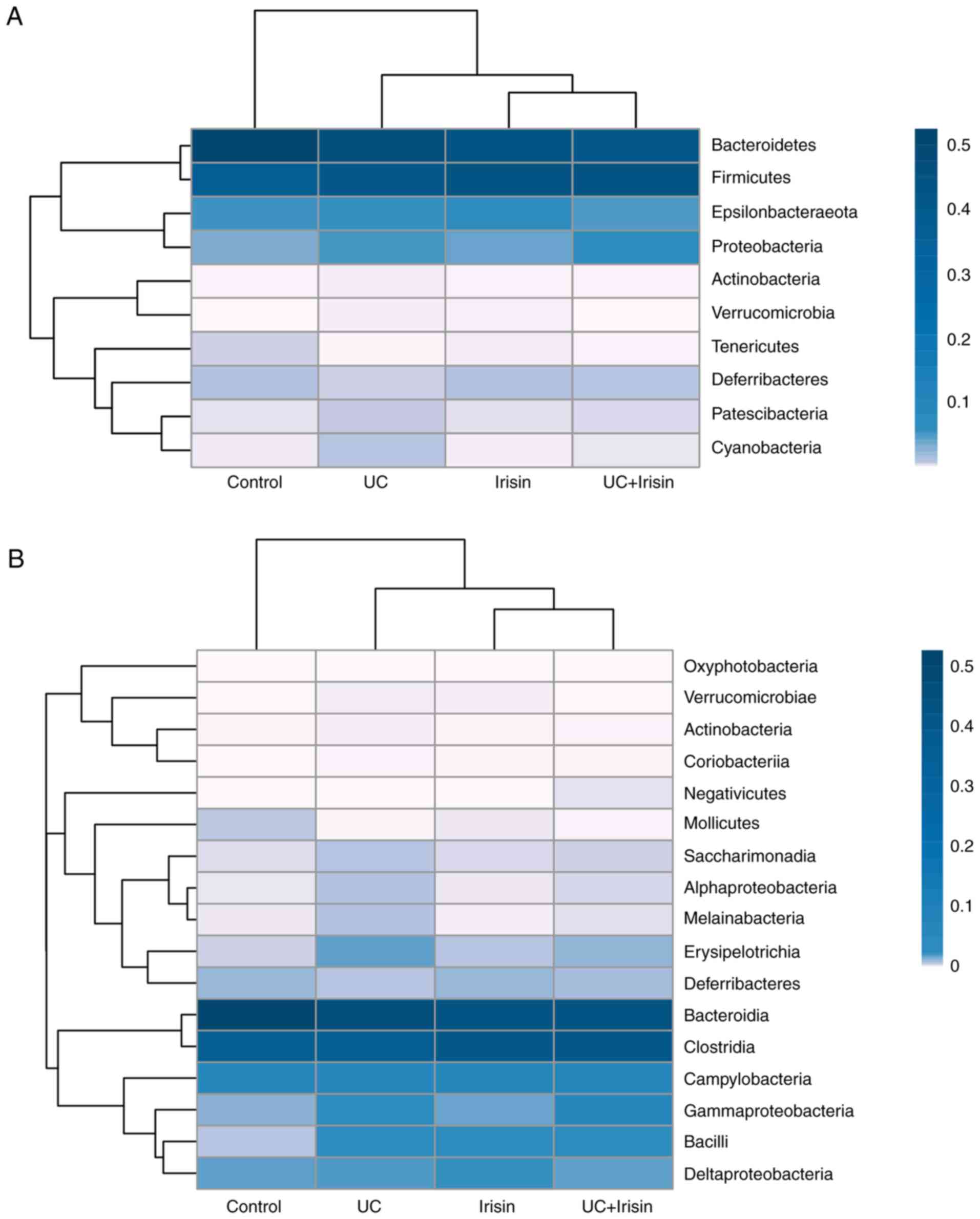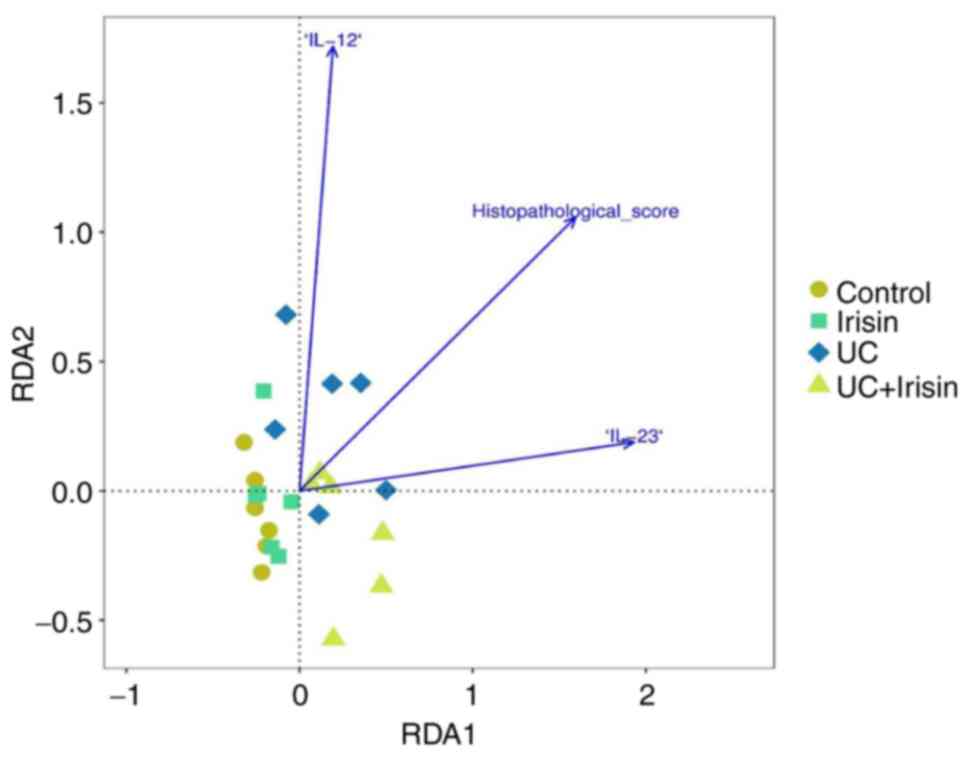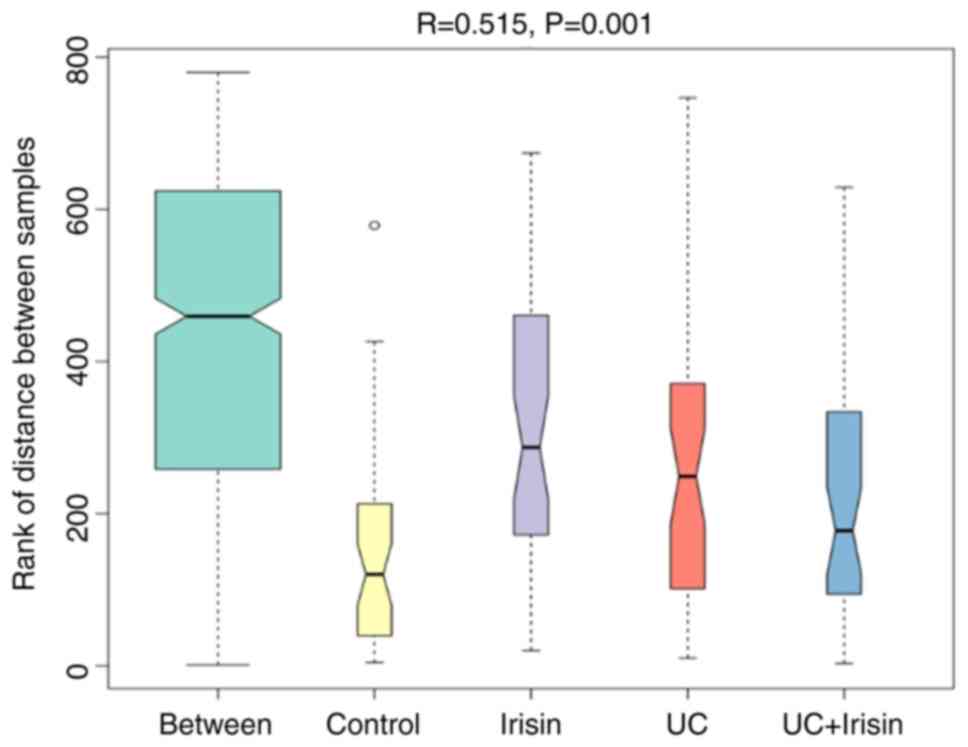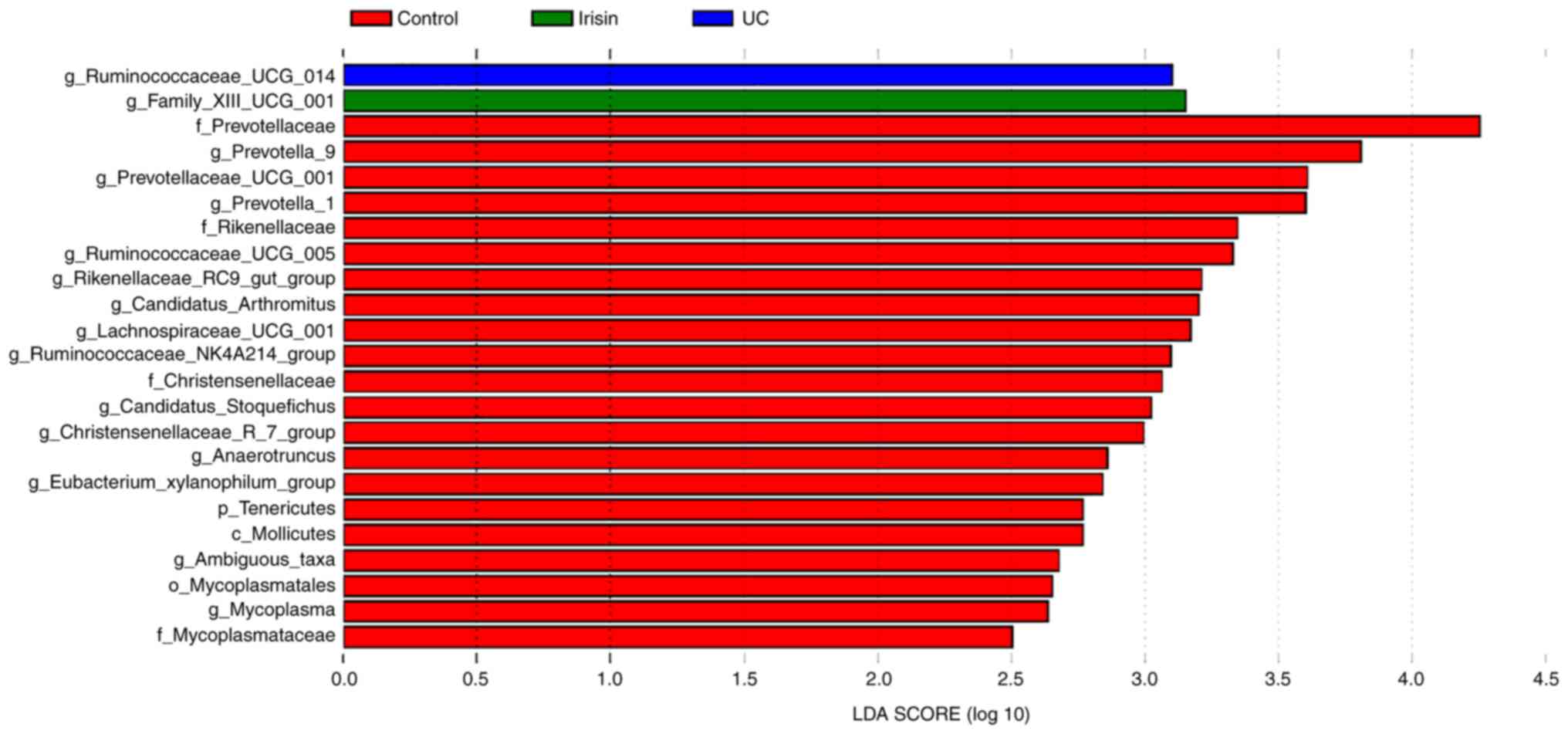|
1
|
Anzai H, Hata K, Kishikawa J, Ishii H,
Yasuda K, Otani K, Nishikawa T, Tanaka T, Kiyomatsu T, Kawai K, et
al: Appendiceal orifice inflammation is associated with proximal
extension of disease in patients with ulcerative colitis.
Colorectal Dis. 18:0278–0282. 2016.PubMed/NCBI View Article : Google Scholar
|
|
2
|
Podolsky DK: Inflammatory bowel disease. N
Engl J Med. 347:417–429. 2002.PubMed/NCBI View Article : Google Scholar
|
|
3
|
Grinspan A and Kornbluth A: Positioning
therapy for ulcerative colitis. Curr Gastroenterol.
17(29)2015.PubMed/NCBI View Article : Google Scholar
|
|
4
|
Khor B, Gardet A and Xavier RJ: Genetics
and pathogenesis of inflammatory bowel disease. Nature.
474:307–317. 2011.PubMed/NCBI View Article : Google Scholar
|
|
5
|
Legaki E and Gazouli M: Influence of
environmental factors in the development of inflammatory bowel
diseases. World J Gastrointest Pharmacol Ther. 7:112–125.
2016.PubMed/NCBI View Article : Google Scholar
|
|
6
|
Frank DN, St Amand AL, Feldman RA,
Boedeker EC, Harpaz N and Pace NR: Molecular-phylogenetic
characterization of microbial community imbalances in human
inflammatory bowel diseases. Proc Natl Acad Sci USA.
104:13780–13785. 2007.PubMed/NCBI View Article : Google Scholar
|
|
7
|
Ihara S, Hirata Y and Koike K: TGF-β in
inflammatory bowel disease: A key regulator of immune cells,
epithelium, and the intestinal microbiota. J Gastroenterol.
52:777–787. 2017.PubMed/NCBI View Article : Google Scholar
|
|
8
|
Manichanh C, Rigottier-Gois L, Bonnaud E,
Gloux K, Pelletier E, Frangeul L, Nalin R, Jarrin C, Chardon P,
Marteau P, et al: Reduced diversity of faecal microbiota in Crohn's
disease revealed by a metagenomic approach. Gut. 55:205–211.
2006.PubMed/NCBI View Article : Google Scholar
|
|
9
|
Schwab C, Berry D, Rauch I, Rennisch I,
Ramesmayer J, Hainzl E, Heider S, Decker T, Kenner L, Muller M, et
al: Longitudinal study of murine microbiota activity and
interactions with the host during acute inflammation and recovery.
ISME J. 8:1101–1114. 2014.PubMed/NCBI View Article : Google Scholar
|
|
10
|
Boström P, Wu J, Jedrychowski MP, Korde A,
Ye L, Lo JC, Rasbach KA, Boström EA, Choi JH, Long JZ, et al: A
PGC1-alphadependent myokine that drives brown-fat-like development
of white fat and thermogenesis. Nature. 481:463–468.
2012.PubMed/NCBI View Article : Google Scholar
|
|
11
|
Yi Z, Yi S and Shu-Zhe D: The novel
Myokine-Irisin. Chin J Biochem Mol Biol. 33:429–435. 2017.
|
|
12
|
Farmer SR: Boning up on Irisin. N Engl J
Med. 380:1480–1482. 2019.PubMed/NCBI View Article : Google Scholar
|
|
13
|
Mahgoub MO, D'Souza C, Al Darmaki RSMH,
Baniyas MMYH and Adeghate E: An update on the role of irisin in the
regulation of endocrine and metabolic functions. Peptides.
104:15–23. 2018.PubMed/NCBI View Article : Google Scholar
|
|
14
|
Buscemi S, Corleo D, Vasto S, Buscemi C,
Barile AM, Rosafio G, Randazzo C, Currenti W and Galvano F: Serum
Irisin concentrations in severely inflamed patients. Horm Metab
Res. 52:246–250. 2020.PubMed/NCBI View Article : Google Scholar
|
|
15
|
Mazur-Bialy AI: Superiority of the
Non-glycosylated form over the glycosylated form of Irisin in the
attenuation of adipocytic meta-inflammation: A potential factor in
the fight against insulin resistance. Biomolecules.
9(394)2019.PubMed/NCBI View Article : Google Scholar
|
|
16
|
Mazur-Bialy AI, Pocheć E and Zarawski M:
Anti-inflammatory properties of Irisin, mediator of physical
activity, are connected with TLR4/MyD88 signaling pathway
activation. Int J Mol Sci. 18:701–712. 2017.PubMed/NCBI View Article : Google Scholar
|
|
17
|
Shao L, Meng D, Yang F, Haibo S and Dongqi
T: Irisin-mediated protective effect on LPS-induced acute lung
injury via suppressing inflammation and apoptosis of alveolar
epithelial cells. Biochem Biophys Res Commun. 487:194–200.
2017.PubMed/NCBI View Article : Google Scholar
|
|
18
|
Mazur-Bialy AI, Bilski J, Wojcik D,
Brzozowski B, Surmiak M, Hubalewska-Mazgaj M, Chmura A, Magierowski
M, Magierowska K, Mach T and Brzozowski T: Beneficial effect of
voluntary exercise on experimental colitis in mice fed a High-Fat
Diet: The role of Irisin, adiponectin and proinflammatory
biomarkers. Nutrients. 9(410)2017.PubMed/NCBI View Article : Google Scholar
|
|
19
|
Asadi Y, Gorjipour F, Behrouzifar S and
Vakili A: Irisin peptide protects brain against ischemic injury
through reducing apoptosis and enhancing BDNF in a rodent model of
stroke. Neurochem Res. 43:1549–1560. 2018.PubMed/NCBI View Article : Google Scholar
|
|
20
|
Pitts M: Applied Research Ethics National
Association/Office of Laboratory Animal Welfare. Institutional
Animal Care and Use Committee. A Guide to the New ARENA/OLAW IACUC
Guidebook. Lab Anim (NY). 31:40–42. 2002.PubMed/NCBI View Article : Google Scholar
|
|
21
|
Siegmund B, Lehr HA, Fantuzzi G and
Dinarello CA: IL-1β-converting enzyme (caspase-1) in intestinal
inflammation. Proc Natl Acad Sci USA. 98:13249–13254.
2001.PubMed/NCBI View Article : Google Scholar
|
|
22
|
Murano M, Maemura K, Hirata I, Toshina K,
Nishikawa T, Hamamoto N, Sasaki S, Saitoh O and Katsu K:
Therapeutic effect of intracolonically administered nuclear factor
kappa B (p65) antisense oligonucleotide on mouse dextran sulphate
sodium (DSS)-induced colitis. Clin Exp Immunol. 120:51–58.
2000.PubMed/NCBI View Article : Google Scholar
|
|
23
|
Jumpstart Consortium Human Microbiome
Project Data Generation Working Group. Evaluation of 16S rDNA-based
community profiling for human microbiome research. PLoS One.
7(e39315)2012.PubMed/NCBI View Article : Google Scholar
|
|
24
|
Ng SC, Shi HY, Hamidi N, Underwood FE,
Tang W, Benchimol EI, Panaccione R, Ghosh S, Wu JCY, Chan FKL, et
al: Worldwide incidence and prevalence of inflammatory bowel
disease in the 21st century: A systematic review of
population-based studies. Lancet. 390:2769–2778. 2018.PubMed/NCBI View Article : Google Scholar
|
|
25
|
Porter RJ, Kalla R and Ho GT: Ulcerative
colitis: Recent advances in the understanding of disease
pathogenesis. F1000Res. 9(F1000)2020.PubMed/NCBI View Article : Google Scholar
|
|
26
|
Colquhoun C, Duncan M and Grant G:
Inflammatory bowel diseases: Host-microbial-environmental
interactions in dysbiosis. Diseases. 8(E13)2020.PubMed/NCBI View Article : Google Scholar
|
|
27
|
Kaser A, Zeissig S and Blumberg RS:
Inflammatory bowel disease. Annu Rev Immunol. 28:573–621.
2010.PubMed/NCBI View Article : Google Scholar
|
|
28
|
Martini E, Krug SM, Siegmund B, Neurath MF
and Becker C: Mend your fences: The epithelial barrier and its
relationship with mucosal immunity in inflammatory bowel disease.
Cell Mol Gastroenterol Hepatol. 4:33–46. 2017.PubMed/NCBI View Article : Google Scholar
|
|
29
|
Qin J, Li R, Raes J, Arumugam M, Burgdorf
KS, Manichanh C, Nielsen T, Pons N, Levenez F, Yamada T, et al: A
human gut microbial gene catalogue established by metagenomic
sequencing. Nature. 464:59–65. 2010.PubMed/NCBI View Article : Google Scholar
|
|
30
|
Etienne-Mesmin L, Chassaing B, Desvaux M,
De Paepe K, Gresse R, Sauvaitre T, Forano E, de Wiele TV, Schüller
S, Juge N and Blanquet-Diot S: Experimental models to study
intestinal microbes-mucus interactions in health and disease. FEMS
Microbiol Rev. 43:457–489. 2019.PubMed/NCBI View Article : Google Scholar
|
|
31
|
O'Callaghan AA and Corr SC: Establishing
boundaries: The relationship that exists between intestinal
epithelial cells and gut-dwelling bacteria. Microorganisms 7:
Efficiency of cancer therapy. Front Microbiol.
10(1050)2019.PubMed/NCBI View Article : Google Scholar
|
|
32
|
Ma W, Mao Q, Xia W, Dong G, Yu C and Jiang
F: Gut microbiota shapes the efficiency of cancer therapy. Front
Microbiol. 10(1050)2019.PubMed/NCBI View Article : Google Scholar
|
|
33
|
Mika A, Van Treuren W, González A, Herrera
JJ, Knight R and Fleshner M: Exercise is more effective at altering
gut microbial composition and producing stable changes in lean mass
in juvenile versus adult male F344 rats. PLoS One.
10(e0125889)2015.PubMed/NCBI View Article : Google Scholar
|
|
34
|
Mohr AE, Jäger R, Carpenter KC, Kerksick
CM, Purpura M, Townsend JR, West NP, Black K, Gleeson M, Pyne DB,
et al: The athletic gut microbiota. J Int Soc Sports Nutr.
17(24)2020.PubMed/NCBI View Article : Google Scholar
|
|
35
|
Luo B, Xiang D, Nieman DC and Chen P: The
effects of moderate exercise on chronic stress-induced intestinal
barrier dysfunction and antimicrobial defense. Brain Behav
Immunity. 39:99–106. 2014.PubMed/NCBI View Article : Google Scholar
|
|
36
|
Clarke SF, Murphy EF, O'Sullivan O, Lucey
AJ, Humphreys M, Hogan A, Hayes P, O'Reilly M, Jeffery IB,
Wood-Martin R, et al: Exercise and associated dietary extremes
impact on gut microbial diversity. Gut. 63:1913–1920.
2014.PubMed/NCBI View Article : Google Scholar
|
|
37
|
Allen JM, Berg Miller ME, Pence BD,
Whitlock K, Nehra V, Gaskins HR, White BA, Fryer JD and Woods JA:
Voluntary and forced exercise differentially alters the gut
microbiome in C57BL/6J mice. J Appl Physiol. 118:1059–1066.
2015.PubMed/NCBI View Article : Google Scholar
|
|
38
|
Yang Y, Gang C, Qian Y, Juan Y, Xueting C,
Pamo T, Xiaolan C, Chunping H, Shuangquan Z and Peng C: Gut
microbiota drives the attenuation of dextran sulphate
sodium-induced colitis by Huangqin decoction. Oncotarget.
8:48863–48874. 2017.PubMed/NCBI View Article : Google Scholar
|
|
39
|
Liu JH, Chen ZL, Li Y and Yu DJ:
Development of denaturant gradient gel electrophoresis for analysis
of intestinal microflora community diversity. Chin J Veterinary Sci
Technol. 35:2006.
|
|
40
|
Donaldson GP, Ladinsky MS, Yu KB, Sanders
JG, Yoo BB, Chou WC, Conner ME, Earl AM, Knight R, Bjorkman PJ and
Mazmanian SK: Gut microbiota utilize immunoglobulin A for mucosal
colonization. Science. 360:795–800. 2018.PubMed/NCBI View Article : Google Scholar
|
|
41
|
Moor K, Diard M, Sellin ME, Felmy B,
Wotzka SY, Toska A, Bakkeren E, Arnoldini M, Bansept F, Co AD, et
al: High-avidity IgA protects the intestine by enchaining growing
bacteria. Nature. 544:498–502. 2017.PubMed/NCBI View Article : Google Scholar
|
|
42
|
Frehn L, Jansen A, Bennek E, Mandic AD,
Temizel I, Tischendorf S, Verdier J, Tacke F, Streetz K, Trautwein
C and Sellge G: Distinct patterns of IgG and IgA against food and
microbial antigens in serum and feces of patients with inflammatory
bowel diseases. PLoS One. 9(e106750)2014.PubMed/NCBI View Article : Google Scholar
|
|
43
|
Kurashima Y and Kiyono H: Mucosal
ecological network of epithelium and immune cells for gut
homeostasis and tissue healing. Annu Rev Immunol. 35:119–147.
2017.PubMed/NCBI View Article : Google Scholar
|
|
44
|
Pei LY, Ke YS, Zhao HH, Wang L, Jia C, Liu
WZ, Fu QH, Shi MN, Cui J and Li SC: Role of colonic microbiota in
the pathogenesis of ulcerative colitis. BMC Gastroenterol.
19(10)2019.PubMed/NCBI View Article : Google Scholar
|
|
45
|
Li X, Jamal M, Guo P, Jin Z, Zheng F, Song
X, Zhan J and Wu H: Irisin alleviates pulmonary epithelial barrier
dysfunction in sepsis-induced acute lung injury via activation of
AMPK/SIRT1 pathways. Biomed Pharmacother.
118(109363)2019.PubMed/NCBI View Article : Google Scholar
|
|
46
|
Chen K, Xu Z, Liu Y, Wang Z, Li Y, Xu X,
Chen C, Xia T, Liao Q, Yao Y, et al: Irisin protects mitochondria
function during pulmonary ischemia/reperfusion injury. Sci Transl
Med. 9(eaao6298)2017.PubMed/NCBI View Article : Google Scholar
|
|
47
|
Narayanan SA, Metzger CE, Bloomfield SA
and Zawieja DC: Inflammation-induced lymphatic architecture and
bone turnover changes are ameliorated by Irisin treatment in
chronic inflammatory bowel disease. FASEB J. 32:4848–4861.
2018.PubMed/NCBI View Article : Google Scholar
|
|
48
|
Murphy KM, Ouyang W and Farrar JD:
Signaling and transcription in T helper development. Annu Rev
Immunol. 18:451–494. 2000.PubMed/NCBI View Article : Google Scholar
|
|
49
|
Fuss IJ, Becker C, Yang Z, Groden C,
Hornung RL and Heller F: Both IL-12p70 and IL-23 are synthesized
during active Crohn's disease and are down-regulated by treatment
with anti-IL-12 p40 monoclonal antibody. Inlamm Bowel Dis. 12:9–15.
2006.PubMed/NCBI View Article : Google Scholar
|
|
50
|
Grivennikov DI, Wang K, Mucida D, Wtewart
C, Schnabl B and Jauch D: Adenoma-linked barrier defects and
microbial products drive IL-23/IL-17-mediated tumor growth. Nature.
491:254–258. 2012.PubMed/NCBI View Article : Google Scholar
|
|
51
|
Wang BY, Liu FL, Hu Z, Yu CH, Xia XT, Fan
JY and Li X: Effects of Tongxieyaofang on serum levels of
interleukin-12 and neuropeptide Y in rats with ulcerative colitis.
Hun J Traditional Chin Med. 32:166–167. 2016.
|
|
52
|
Fiorino G, Allocca M, Correale C, Roda G,
Furfaro F, Loy L, Zilli A, Peyrin-Biroulet L and Danese S:
Positioning ustekinumab in moderate-to-severe ulcerative colitis:
New kid on the block. Expert Opin Biol Ther. 20:421–427.
2020.PubMed/NCBI View Article : Google Scholar
|
|
53
|
Beaudoin M, Goyette P, Boucher G, Lo KS,
Rivas MA, Stevens C, Alikashani A, Ladouceur M, Ellinghaus D,
Törkvist L, et al: Deep resequencing of GWAS loci identifies rare
variants in CARD9, IL23R and RNF186 that are associated with
ulcerative colitis. PLoS Genet. 9(e1003723)2013.PubMed/NCBI View Article : Google Scholar
|
|
54
|
Bianchi E and Rogge L: The IL-23/IL-17
pathway in human chronic inflammatory diseases-new insight from
genetics and targeted therapies. Microbes Infect. 21:246–253.
2019.PubMed/NCBI View Article : Google Scholar
|
|
55
|
Niederreiter L, Adolph TE and Kaser A:
Anti-IL-12/23 in Crohn's disease: Bench and bedside. Curr Drug
Targets. 14:1379–1384. 2013.PubMed/NCBI View Article : Google Scholar
|
|
56
|
Eichele DD and Kharbanda KK: Dextran
sodium sulfate colitis murine model: An indispensable tool for
advancing our understanding of inflammatory bowel diseases
pathogenesis. World J Gastroenterol. 23:6016–6029. 2017.PubMed/NCBI View Article : Google Scholar
|
|
57
|
Chassaing B, Aitken JD, Malleshappa M and
Vijay-Kumar M: Dextran sulfate sodium (DSS)-induced colitis in
mice. Curr Protoc Immunol. 104:15.25.1–15.25.14. 2014.PubMed/NCBI View Article : Google Scholar
|
|
58
|
Shimizu T, Suzuki M, Fujimura J, Hisada K,
Yoshikazu O, Obinata K and Yamashiro Y: The relationship between
the concentration of dextran sodium sulfate and the degree of
induced experimental colitis in weanling rats. Pediatr
Gastroenterol Nutr. 37:481–486. 2003.PubMed/NCBI View Article : Google Scholar
|
|
59
|
Axelsson LG, Landström E, Goldschmidt TJ,
Grönberg A and Bylund-Fellenius AC: Dextran sulfate sodium (DSS)
induced experimental colitis in immunodeficient mice: Effects in
CD4(+) -cell depleted, athymic and NK-cell depleted SCID mice.
Inflamm Res. 45:181–191. 1996.PubMed/NCBI View Article : Google Scholar
|
|
60
|
Vowinkel T, Kalogeris TJ, Mori M,
Krieglstein CF and Granger DN: Impact of dextran sulfate sodium
load on the severity of inflammation in experimental colitis. Dig
Dis Sci. 49:556–564. 2004.PubMed/NCBI View Article : Google Scholar
|
|
61
|
Borody TJ, Warren EF, Leis S, Surace R and
Ashman O: Treatment of ulcerative colitis using fecal
bacteriotherapy. Clin Gastroenterol. 37:42–47. 2003.PubMed/NCBI View Article : Google Scholar
|
|
62
|
Zhang T, Chen Y, Wang Z, Zhou Y, Zhang S,
Wang P, Xie S and Jiang B: Changes of fecal flora and its
correlation with inflammatory indicators in patients with
inflammatory bowel disease. Nan Fang Yi Ke Da Xue Xue Bao.
33:1474–1477. 2013.PubMed/NCBI(In Chinese).
|















